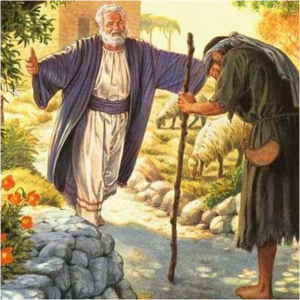The Parable of the Lost Son
Mike Johnson

There are three very well know parables recorded in Luke 15. They are the parables of the “Lost Sheep,” the “Lost Coin,” and the “Lost Son.” The setting in which Jesus presented these parables is in verses 1-2. The publicans and sinners had drawn near Christ, prompting the Pharisees and scribes to murmur. They said, “This Man receives sinners and eats with them.”
This reaction seemed to have prompted the three parables. In this article, we will examine the “Parable of the Lost Son. This parable is only in the book of Luke and is looked upon by many as the most beautiful of all parables.
The Departure
The first part of the parable reveals that a man had two sons and that the younger of the two brothers requested his inheritance.
In verse 12, he said, “Father, give me the portion of goods that falls to me. So he divided to them his livelihood.” His Father complied with the request. (Deuteronomy 21:17 indicates that a firstborn son would receive a double portion of his Father’s property. So if there were two sons, the older would have two-thirds while the younger would receive one-third.) The younger son left home with his inheritance and went to a far country. Verse 13 says he wasted his substance with prodigal living (“loose living” NASB). Later, his brother accused him of devouring his wealth with harlots (V. 30). So the young man plunged into loose and reckless living.
The son wanted to be free from his Father, desiring to leave his influence and control. From a spiritual standpoint, many are like this today as they depart from their Father (God) and seek to be independent of His way. John 8:32 says, “And you shall know the truth, and the truth shall make you free.” The only real freedom is found “in Christ.” Also, in the parable, the son went into a “far country.” The young man going to a far country would represent a state of “departure” or “forgetfulness of God.” He had once been in his Father’s household, but now he has departed from him. Spiritually, many today are in the same position as they have left their heavenly Father and have gone to the world of sin.
His Condition
After the young man wasted his money, a great famine came, and he became in need. Verse 15 says that he joined himself with a citizen of the country who sent him into his fields to feed swine. This action might be called the first step in his degradation. The assumption is that the young man was a Jew. The Jews viewed swine as unclean, so this young man had gone from the position of being a son in a wealthy family to the status of a swine feeder, which was an especially deplorable occupation for Jews. Verse 16 shows another stage of his degradation. It says that he desired to eat the pods used to feed the swine. (It is thought that these were the long bean-shaped pods from the carob tree. These pods were used by the poorest of the people.) The NASB says, “And he was longing to fill his stomach with the pods that the swine were eating. . . .” He was starving; the young man had fallen far.
Consider a few principles. When people are near their Father, God, they are very wealthy from a spiritual standpoint — when people are faithful children of God, they have abundant spiritual blessings. They have the hope of eternal life, and such people can have confidence in their prayers.
However, when people depart from God, they are in a state of being very poor spiritually. They are in a dishonorable and shameful condition, which is parallel to the son’s shame (vs. 14-16). Various passages in God’s Word also describe the shameful position of the apostate. 2 Peter 2:22, speaking of some who had escaped the pollutions of the world and were again entangled therein, says, “. . . But it has happened to them according to the true proverb: ‘A dog returns to his own vomit,’ and, a sow, having washed, to her wallowing in the mire.’” Consider the evaluation of Christ for even a lukewarm Christian in Revelation 3:16, which says, “So then, because you are lukewarm, and neither cold nor hot, I will vomit you out of My mouth.” The son in the parable left his Father and was in a very deplorable state. Similarly, if we depart from God, we will be in a sad state and will need to come out of it.
His Realization
The son, being in a position of feeding swine, became so hungry that he desired their food. Verse 17 points out that he came to himself. He said, “. . . ‘How many of my father’s hired servants have bread enough and to spare, and I perish with hunger!” He now sees his error in requesting his share of the estate, going into a far country, and spending his money on loose living. He soon begins to appreciate his Father’s home, which he had so eagerly left and returns to his Father’s waiting arms.
In like manner, apostates today need to “come to themselves.” They have departed from God and must recognize their pitiful and lost condition. Erring Christians must realize the danger they have placed their souls in and the negative impact of their actions on others. In the parable, the father joyfully received his son. So likewise, the return of a penitent person will result in a joyful acceptance from God. We must “come to our senses” (NASB) before it is too late!

